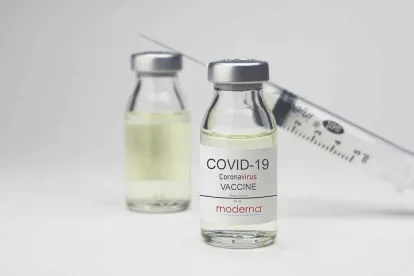Readers will recall that in the early months of the COVID-19 pandemic, the EEOC published a plethora of responses and updates to frequently asked COVID-19 questions. As the months went by, the pace of EEOC updates slowed, and many employers settled into their “COVID-19 routines.”
Flash forward to now – the eve of Memorial Day, 2021. Half of all Americans have received at least one vaccination dose, case numbers are falling to levels not seen in a year, and more and more employers are preparing for a new normal, with state after state lifting mask mandates and other requirements. Following the CDC’s recent guidance on masks for fully vaccinated people, the EEOC has now issued updates to the FAQ’s contained in the agency’s technical assistance regarding COVID-19.
The new guidance covers a number of vaccine-related items, including employer-mandated vaccine policies, ADA reasonable accommodation guidance for vaccine exemptions, Title VII religious and pregnancy exemption details, employer-implemented incentives for voluntary vaccine programs, and general guidance for what employers can and cannot ask employees under federal employment nondiscrimination law.
Some of the more significant items covered in the new guidance include:
Mandatory Vaccine Requirements
The EEOC’s position is that federal Equal Employment Opportunity laws do not prevent an employer from requiring all employees physically entering the workplace to be vaccinated for COVID-19, subject to reasonable accommodation provisions of federal nondiscrimination laws.
However, employers must account for the following:
-
Disability and Religious Exemptions
An employee who declines vaccination due to an ADA-covered disability or a sincerely held religious belief, practice, or observance may be entitled to a reasonable accommodation, depending on the individual circumstances.
The guidance provides examples of potential accommodations, including requiring an unvaccinated employee to wear a face mask, work at a social distance from coworkers or non-employees, work a modified shift, get periodic tests for COVID-19, be given the opportunity to telework, or accept a reassignment.
-
Vaccine Exemptions Due to Pregnancy
If an employee seeks an exemption from a vaccine requirement due to pregnancy, the employer must ensure that the employee is not being discriminated against compared to other employees similar in their ability or inability to work.
This means that a pregnant employee may be entitled to job modifications, including telework, changes to work schedules or assignments, and leave to the extent such modifications are provided for other employees who are similar in their ability or inability to work.
Additionally, employers with a mandatory vaccine policy should be aware of (and prepared to address) the possibility that such a requirement may have a disparate impact (or disproportionately have the effect of excluding) employees based on protected categories such as race, color, religion, sex, national origin or age.
The most common cause for such a disparate impact occurs where the opportunity to secure a vaccination (due to time off or location) is more limited for various segments of the population. Employers can assist in reducing or eliminating such disparity by steps such as offering paid time off for vaccinations during the work day, and identifying locations and means to get to vaccination sites.
Vaccine Documentation
According to the EEOC, requesting documentation or other confirmation showing that an employee received a COVID-19 vaccination in the community is not a disability-related inquiry covered by the ADA, and it does not implicate Title II of GINA (the Genetic Information Nondiscrimination Act).
Information regarding any individual employee’s COVID-19 vaccination is considered confidential medical information under the ADA and as such must be kept confidential and stored separately from the employee’s personnel files.
Incentive Programs
The EEOC confirmed that federal Equal Employment Opportunity laws do notprevent employers from offering an incentive to employees for voluntarily receiving a vaccination, so long as any incentive (which includes both rewards and penalties) is not so substantial as to be coercive. Specifically:
Employer Incentives to Provide Proof of Vaccine
The guidance provides that employers may offer an incentive to employees who provide documentation or confirmation that they or their family members received a vaccination (e.g., vaccine card) from their own health care provider (e.g., doctor, hospital, pharmacy, or other health care professional not acting on the employer’s behalf). The incentive limit discussed below would not apply in this circumstance. The employer is required to keep vaccination information confidential pursuant to ADA.
Employer Incentives to Get Vaccinated Through Employer Program
The guidance also provides that employers may offer an incentive (which includes both rewards and penalties) to employees who receive a vaccination administered by the employer (or an employer’s vendor such as an on-site clinic administrator or wellness vendor), so long as any incentive “is not so substantial as to be coercive.” The EEOC states that “a very large incentive” could make an employee feel pressured into disclosing protected medical information. Unfortunately, the guidance does not further elaborate on this “coercive” threshold. For those familiar with the EEOC rules governing wellness programs, this puts employers in a similar predicament of not having a clear guide on what is “voluntary” versus “coercive.” Note that employers cannot offer an employee an incentive in return for an employee’s family member getting vaccinated through an employer-administered vaccination program.
In addition to the technical guidance, the EEOC also has circulated a resource for job applicants and employees, giving information on how federal anti-discrimination laws apply to the COVID-19 pandemic.
Finally, it is likely that we’ll be receiving further guidance from the EEOC in the weeks to come. Although the recent updates come on the heels of the CDC’s recent guidance on mask requirements and vaccines, in today’s release the EEOC made it clear that it is currently “considering the impact of this CDC guidance on EEOC’s COVID-19 technical assistance provided to date.” We will keep our readers posted as to any further guidance or developments.






 />i
/>i
